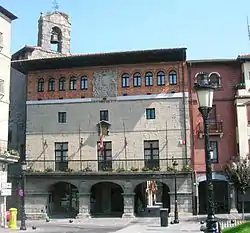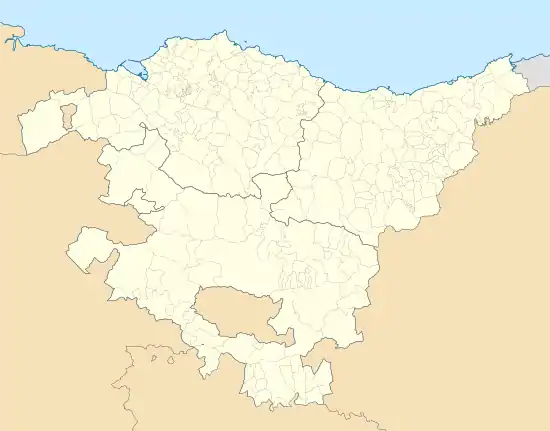Orduña-Urduña
Urduña/Orduña (Basque: Urduña; Spanish: Orduña) is an exclave and municipality of 4,232 inhabitants located in the province of Biscay, in the autonomous community of Basque Country, in the North of Spain.
Urduña/Orduña | |
|---|---|
 Urduña/Orduña Town Hall | |
 Flag  Coat of arms | |
 Urduña/Orduña Location of Urduña/Orduña within the Basque Country | |
| Coordinates: 42°59′45″N 3°00′30″W | |
| Country | Spain |
| Autonomous community | Basque Country |
| Province | Biscay |
| Comarca | Arratia-Nerbioi |
| Founded | 1229 |
| Government | |
| • Mayor | Idoia Aginako Arbaiza (EH Bildu) |
| Area | |
| • Total | 33.49 km2 (12.93 sq mi) |
| Elevation | 293 m (961 ft) |
| Population (2018)[1] | |
| • Total | 4,180 |
| • Density | 120/km2 (320/sq mi) |
| Demonym | Spanish: orduñés |
| Time zone | UTC+1 (CET) |
| • Summer (DST) | UTC+2 (CEST) |
| Postal code | 48460 |
| Official language(s) | Basque Spanish |
| Website | Official website |
Geography
.jpg.webp)
View of the valley of Orduña

Train station
The municipality is an exclave of Biscay, surrounded entirely by the Basque province of Álava and the province of Burgos, part of Castile and León. It is located in a plain in the highest part of the Nervión river valley, at the foot of the Sierra Salbada mountains. The municipality contains the small exclave of Cerca de Villaño, surrounded by the neighbouring province of Burgos.[2]
Orduña is the final station of the commuter rail line C-3 that links the town with Bilbao.
Notable people
- Juan de Garay (1528–1583), conquistador, governor, founder of Buenos Aires and Santa Fe
- Alberto Alcocer y Ribacoba (1886–1957), politician, mayor of Madrid and secretary general of the Bank of Spain
- Iván Fandiño (1980–2017), bullfighter
References
- Municipal Register of Spain 2018. National Statistics Institute.
- Errazti, Izaskun (14 December 2017). "El cachito de Bizkaia que está en Burgos y no sale en los mapas". El Correo (in Spanish). Retrieved 12 May 2022.
External links
- http://www.orduna.org: Local (in Spanish)
- ORDUÑA in the Bernardo Estornés Lasa - Auñamendi Encyclopedia (Euskomedia Fundazioa) (in Spanish)
- Apuntaciones históricas de la Ciudad de Orduña. José Antonio de Armona y Murga, 1789 (in Spanish)
This article is issued from Wikipedia. The text is licensed under Creative Commons - Attribution - Sharealike. Additional terms may apply for the media files.
